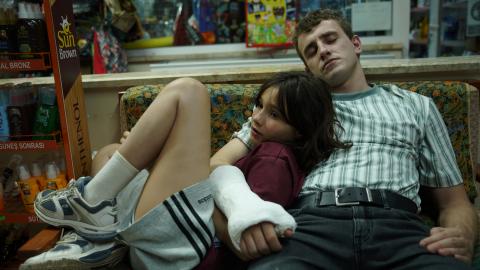AFTERSUN: A Remarkable Debut Memory Film

AFTERSUN
The following notes on Charlotte Wells's Aftersun were written by Nick Sansone, PhD student in film in the Department of Communication Arts at UW Madison. The Cinematheque will present Aftersun in our Premieres series on Thursday, February 2 at 7 p.m. in our regular venue, 4070 Vilas Hall, 821 University Ave. Free admission!
By Nick Sansone
When looking back at the movie year 2022, one of the most significant trends was the increase of auteur-driven “memory films,” original writer-director projects deeply rooted in a filmmaker’s own memory of either their own childhood or the various goings-on around their growing-up. While filmmakers like Alfonso Cuarón and Kenneth Branagh had engaged in these types of work with Roma and Belfast in previous years, 2022 brought such films as Steven Spielberg’s The Fabelmans, James Gray’s Armageddon Time, and Sam Mendes’ Empire of Light, all of which served as cinematic reflections of a particular time during the filmmakers’ coming-of-age and were largely based in their own memories of the period. However, a very different sort of memory film opened in limited release alongside these other works last fall and quickly garnered a higher level of universal critical acclaim than the other aforementioned 2022 memory films.
But rather than the long-awaited memory film of a legendary Hollywood filmmaker, Aftersun is the debut feature of a largely-unknown Scottish filmmaker named Charlotte Wells. Having initially garnered attention with a trilogy of short films she directed as an MFA student at New York University, Wells collaborated on this first feature with Moonlight creators Barry Jenkins and Adele Romanski, and the latter film’s artistic rendering of memory and youth coming-of-age amidst a broken family dynamic is very much reflected in how Wells approaches this story, albeit with a heightened sense of ambiguity and mystery that more than helps it stand on its own.
Aftersun’s unique approach is established almost immediately, as the film is framed as a flashback to the childhood of protagonist Sophie (played by Frankie Corio as a child and Celia Rowlson-Hall as an adult), and specifically a vacation she took as an eleven-year-old with her father Calum (Paul Mescal) to a Turkish resort in the mid-to-late-1990s. While on this vacation, she becomes forced to grapple with her father’s humanity, and the fact that he has pain and trauma and regret and all the things that every human faces in an amplified manner. And in the present-day, the adult Sophie watches a series of miniDV tapes of the aforementioned vacation in an attempt to understand the person that her father was when raising her.
Within its framework as a memory film, Aftersun seeks to capture the feeling of grappling with the humanity of a parent much later in life, when it is far too late to actually have a real conversation with them. Like many acclaimed art filmmakers (she specifically cites Chantal Akerman as a key influence), Wells constructs this film as a cryptic puzzle, slowly revealing information throughout while still keeping it vague enough that different viewers can come up with differing interpretations as to the nature of this specific father-daughter relationship and what exactly the adult Sophie is trying to understand about her father.
But despite the mysterious and cryptic nature of the film, there are strong undercurrents of clinical depression and repressed sexuality that run throughout its entirety. Specifically, the film’s portrayal of the former is communicated in the most subtle of ways, as Wells allows the viewer to pick up on various things such as books on a hotel room shelf, seemingly-throwaway lines of dialogue and understated gestures in order to construct the picture for themselves. And helping to serve as a guide throughout this is Paul Mescal, whose performance as Calum does much to allow his character to become three-dimensional outside of his daughter’s memories.
In addition, Wells makes careful use of certain pop music to evoke the film’s primary time period (i.e., 1996-97), re-contextualizing such songs as Los del Río’s “Macarena” and R.E.M.’s “Losing My Religion” in order to both evoke nostalgia and establish a sense of distance that comes with reflecting from a new perspective. But it is in the third act of the film where Wells applies this re-contextualization to the song “Under Pressure” by Queen and David Bowie in such a way that all but transforms it. This artistic choice then culminates in a final shot that furthers the abstract and ethereal nature of the entire enterprise, while keeping Sophie’s conflicting emotions front-and-center and never letting the form overwhelm those emotions.
As Hollywood is currently in the midst of an Oscar season that is largely dominated by such films as Everything Everywhere All At Once, The Fabelmans, The Banshees of Inisherin, and Tár (among others), it is very easy for smaller arthouse-oriented films like Aftersun to get lost in the shuffle, especially when they don’t carry big-name actors, directors, or awards-campaigning budgets, or when they require a particular patience and distraction-free environment in order to appreciate their many gifts. But the Cinematheque screening of Aftersun gives us the chance to allow this film to stand on its own theatrically in Madison and be seen communally on the big screen as a bold artistic statement from a first-time feature filmmaker with a promising career ahead of her.
